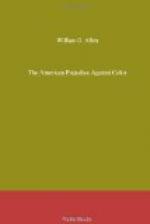She related to me the events of the two preceding weeks as she had known them to transpire in her own family, and as she had heard of them as transpiring in the village. I cannot write the details. It chills my blood to think of them. The various letters published in this narrative will suffice to give the reader some idea of things as they were; while the hundreds of things which cannot be written and which, because of their littleness are the more faithful exponents of meanness, must be left to the reader to imagine as best he can. I say as best he can, since no Englishman can imagine the thing precisely as it was.
She was reviled, upbraided, ridiculed, tormented; and by some, efforts were made to bribe her into the selling of her conscience. What the vilest and most vulgar prejudices could suggest were hurled at both our devoted heads. Letters were not permitted to be received or sent without their being first inspected by the parents. And finally she was imprisoned after the manner set forth in the letter of Mr. Porter. So rigid was the surveillance that her sister was also put under the same “regimen,” because her sympathies were with the persecuted and not the persecutors.
When we met, therefore, we were not long in determining what was our duty. And now, Reader, what would you have done? Just what we did—no doubt. Made up your mind to have sacrificed nothing upon the altar of a vulgar prejudice. Such was the nature of the demand—would it not have been base to have yielded?
We concluded that now, more than ever, we would obey our heart’s convictions, though all the world should oppose us; that, come what would, we would stand by each other, looking to Heaven to bless us, and not to man, for either smiles or favor.
We were resolved, but there was a difficulty yet. Determined to exercise our God-given rights, we were still overpowered by the physical force of the whole community. An open declaration by either party of our resolve would have been not less than consummate madness. To exercise our rights, therefore, not as we would but as we could, was the only hope left us.
We resolved to marry and flee the Country. Miss King returned to Fulton; after remaining there a week or ten days she went to Pennsylvania ostensibly to teach in a school. We corresponded by means of a third person; and my arrangements being made, we met in New York City, on March 30th, according to appointment; were married immediately and left for Boston. In Boston, we remained ten days, keeping as quiet as possible, in the family of a beloved friend, and on the 9th of April, took passage for Liverpool.
Since our arrival in this Country, we have received several American papers. The following Article is from one of the Western New York papers, which is but a specimen of the articles published by all the pro-slavery papers throughout the land on the announcement of the marriage, shows that the flight to England completed the victory. To have remained to be killed would have been fun to be relished. But public sentiment abroad—ah, that is another thing, and not so pleasant to be thought of:—




